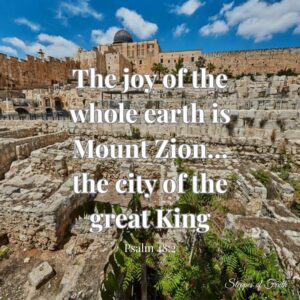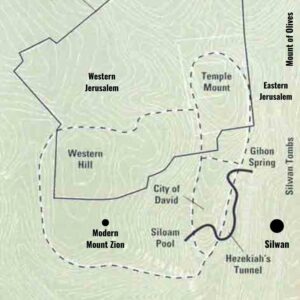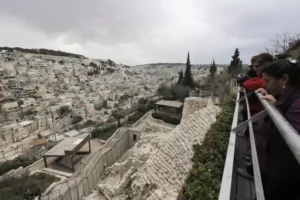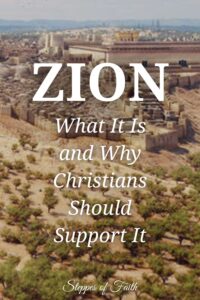
“The joy of the whole earth is Mount Zion…the city of the great King.” (Psalm 48:2)
You may have seen it: news coverage of the Middle East occasionally mentions protestors shouting some variation of “Down with Zion!” In recent years, Zion and Zionism have become dirty words often equated with antisemitism (a misnomer in itself). Unfortunately, some people use these terms without understanding their true meanings. Yet Zion is deeply rooted in the Bible, established and protected by God, yet often misunderstood.
Mentioned in the Bible over 150 times, Zion (“fortification”) initially referred to the fortress King David conquered from the Jebusites in 2 Samuel. The hill on which the fortress stood became known as Mount Zion.
“David took the stronghold of Zion (that is, the City of David).” (2 Sam 5:7)
David’s son, Solomon, later built the Temple on neighboring Mount Moriah, and so Zion changed to incorporate the Temple and its surrounding area, including the original location of the fortress.
“Now Solomon assembled the elders of Israel and all the heads of the tribes, the chief fathers of the children of Israel, in Jerusalem, that they might bring the ark of the covenant of the LORD up from the City of David, which is Zion.” (2 Chr 5:2)
Eventually, Zion referred to the entire city of Jerusalem (Is 40:9; Heb 12:22) and then the entire area of Judah (Jer 31:12). Years later, it became a general reference to the entire nation of Israel (Zech 9:13) and its people (Ps 126:1-3; Is 60:14), a name many of its enemies continue to use, often derisively.
From Zion to Silwan
Why do people hate Israel and offensively call it Zion? To understand the conflict between the Jewish and Palestinian people, we must examine the area’s history, which includes a community in eastern Jerusalem called Silwan.
In the early tenth century, King David built his palace on a crest opposite modern Mount Zion in the original City of David, known then simply as Zion. Little to no other housing existed on the hill for thousands of years. However, in the mid-1800s, a Jewish family established a small settlement there and called it Siloach, which means “the place of forgetting” or “place of solace.” The name is a reference to the nearby Pool of Siloam and the Gihon Spring that feeds into it. Ten short years later, a community of Yemenite Jews moved into the settlement’s southern end. Thus, the Jewish community grew in the area.
Later, during the time of the British Mandate (1920-1947), the Arab Riots in 1929 forced the Jews to flee Siloach. A year later, they returned to rebuild but were forced out again in 1938, this time by the British, who confiscated their homes at the height of WWII.
In the Jews’ absence, Arabs settled in Siloach, expanding it into the City of David (in some cases illegally) and changing the settlement’s name to Silwan, the Arabic translation of Siloach. It is still called Silwan today.
Since that time, archaeologists have attempted to excavate Silwan for its Zionist roots, but the Arab people have often refused to cooperate. However, in 2010, archaeologists successfully discovered a massive wall located on a slope separating Silwan and the Temple Mount that dates back to the time of King Solomon (10th century BC). The discovery supports 1 Kings 3:1.
“Now Solomon made a treaty with Pharaoh, king of Egypt, and married Pharaoh’s daughter. Then he brought her to the City of David until he had finished building his own house, the house of the LORD, and the wall all around Jerusalem.”
Unfortunately, the Arab community largely rejects this discovery.

Political Tension
Archaeologists made another remarkable discovery in 1997 during the construction of a visitor center in Silwan. They found two immense towers that date to the 8th-9th centuries BC. One tower protected the base of Warren’s Shaft, a tunnel that allowed access to Gihon Spring from inside the city’s walls. The other protected the spring itself.
Because of these discoveries and others, Jerusalem officials proposed creating a national park along the valley floor in the area separating Silwan from current Mount Zion. The goal was to recreate what was once the King’s Garden (near the Pool of Siloam, where the Gihon Spring empties) and restore the flow of the spring. However, the proposal has ignited controversy among the Arab Silwan residents because the city would need to demolish some of their illegally built homes to make way for construction.
The city has offered to relocate the Arabs into newly built homes. Still, the people resist based on suspicion that the city only seeks to increase the Jewish population in the area. As such, many are demanding legal permits for their established homes, vowing never to leave.
Fueling animosity is the City of David Foundation, which is working to return land in Silwan to the heirs of the Yemenite Jews who immigrated there in 1882. Many Jews have returned to Silwan, but it is not always a safe place. Occasionally, they must employ guards for protection.
Though natives of the land, the Jews are now a minority that is often assaulted by Arab youth and others.

Modern Silwan and original location of Zion
Dividing Zion
Many of the people in places like Silwan (as well as the Gaza Strip and the West Bank) identify themselves as Palestinians who demand an independent state with East Jerusalem as their capital. In their mind, East Jerusalem is a disputed territory or even a territory “occupied” by the Zionists (Jewish people). Other countries support their demands by failing to recognize Jerusalem as Israel’s capital even after Israel won back the area from Jordan in 1968.
To make matters worse, the United Nations has passed multiple resolutions declaring the Temple Mount and East Jerusalem (original Zion/City of David) as Muslim sites. It has passed additional resolutions to prevent archaeologists from any possible discoveries around the Old City, which would help prove the biblical truth of Israel’s Jewish heritage.
Zionism, by definition, is the belief that Jewish people are entitled to self-determination in their ancient homeland and have a right to exist. Most of the world’s countries possess this right, but not Israel. Like people everywhere, the Jewish people desire to live in peace and harmony with their neighbors, but the neighbors fight vehemently to prevent it.
Nevertheless, the international community continues pushing Israel into a divided state, saying it is the only way to peace. Of course, Israel, established by God under the Mosaic Covenant (Exodus 19-24), outright rejects a two-state solution. Any effort it takes to reclaim its land is often ironically regarded as the “occupation of Arab lands” and a “systematic, deliberate, and provocative” effort to stop Jerusalem from becoming the capital of two states (Israel Today).
Just as the ancient prophets foretold, the land of Israel remains a disputed territory. But if we turn to the Bible, we find the truth about Zion, who it truly belongs to, and what God thinks about it.
Blessings and Curses
Early in the pages of the Old Testament, God declared His love for Zion Israel. In Genesis 12, the Lord commands Abram to leave his country and go to the land that God is giving him to possess.
“Get out of your country, from your family and from your father’s house, to a land that I will show you. I will make you a great nation. I will bless you and make your name great, and you shall be a blessing.” (Gen 12:1-2)
The Lord goes on, eternally placing His mighty hand on His chosen nation.
“I will bless those who bless you, and I will curse him who curses you. And in you, all the families of the earth shall be blessed.” (Gen 12:3)
God repeats His promise later to Jacob in a narrower scope.
“Let the peoples serve you. Be master over your brethren and let your mother’s sons bow down to you. Cursed be everyone who curses you, and blessed be those who bless you.” (Gen 27:29)
In the New Testament, the apostle Paul reminds us again of God’s promises to Abraham.
“My brethren, my countrymen, according to the flesh, who are Israelites, to whom pertain the adoption, the glory, the covenants, the giving of the law, the service of God, and the promises.” (Rom 9:3-4)
According to the Bible, the nation of Israel is the Lord’s. However, some pastors and other religious leaders teach that the modern church has replaced Israel and that the church is now the recipient of God’s promises. However, as the above verses demonstrate, this “replacement theology” is simply false.
Though believers in Christ have the glorious benefit of the gospel, it does not replace Israel in any way. Believers must reject any notion of superiority to God’s chosen nation (Gal 3:26-29).

Overlooking the City of David from Silwan/original Zion
Zion, God’s Eternal Kingdom
The Bible repeatedly speaks of God’s love for Zion as His chosen city.
“In this house and in Jerusalem, which I have chosen out of all the tribes of Israel, I will put My name forever.” (2 Kings21:7)
“The LORD loves the gates of Zion more than all the dwellings of Jacob. Glorious things are spoken of you, O city of God!” (Ps 87:2-3)
“Beautiful in elevation, the joy of the whole earth is Mount Zion on the sides of the north, the city of the great King. God is in her palaces; He is known as her refuge.” (Ps 48:2-3)
The Bible also refers to Zion as the birthplace of faith in the Messiah, Jesus, and the new covenant.
“Behold, I lay in Zion a chief cornerstone, elect, precious, and he who believes on Him will by no means be put to shame.” (Is 28:16; 1 Pet 2:6)
But Zion is more than a city; It has deep spiritual meaning. Several times, the Bible uses the name Zion figuratively to indicate God’s eternal kingdom.
“Those who trust in the LORD are like Mount Zion, which cannot be moved but abides forever.” (Ps 125:1)
“Then I looked, and behold, a Lamb standing on Mount Zion.” (Rev 14:1)
Zion belongs to the Lord, and it will continue standing even in the last days.
A Chosen Nation
As the world futilely fights for control over Zion Israel, Isaiah 52 and 60 make clear that the Lord Himself will personally possess it one day, and His people will forever dwell in the land.
“Awake, awake! Put on your strength, O Zion. Put on your beautiful garments, O Jerusalem, the holy city! How beautiful upon the mountains are the feet of him who… says to Zion, ‘Your God reigns!’ Your watchmen shall lift up their voices, with their voices they shall sing together, for they shall see eye to eye when the LORD brings back Zion.” (Is 52:1, 7-8)
“Also, the sons of those who afflicted you shall come bowing to you. And all those who despised you shall fall prostrate at the soles of your feet. And they shall call you The City of the LORD, Zion of the Holy One of Israel.” (Is 60:14)
Zion and Zionism now tend to be antisemitic language, yet the Bible makes it clear: God’s deep love and faithfulness to Zion Israel is absolute. As such, believers in Christ Jesus are encouraged biblically to support (Gen 12:3) and pray for the Jewish people (Ps 122:6), opposing any efforts to weaken or destroy it. After all, we are united as one through our Lord Jesus Christ (Rom 11:17-24; Gal 3:28).
One thing is certain. Zion Israel is and will always be God’s chosen holy nation, and He will establish His eternal kingdom through her.
![]()
IF YOU WOULD LIKE MORE INFORMATION ABOUT ZION AND ISRAEL’S HISTORY, DR. MICHAEL RYDELNIK AND AUTHOR CHRIS FABRY HELD A WONDERFUL DISCUSSION DURING A RECENT EPISODE OF CHRIS FABRY LIVE, WHICH YOU CAN LISTEN TO HERE.
